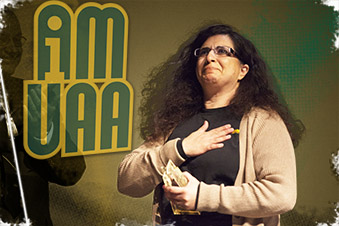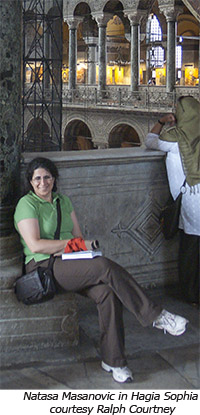Faculty Spotlight: Natasa Masanovic, Ph.D.
by Green & Gold News |
 Associate Professor and Chair, Department of Languages
Associate Professor and Chair, Department of Languages
Hometown: Istanbul, Turkey
Fun Fact: Loves to iron while listening to audiobooks in German
Every Sunday for the last 18 years, Natasa Masanovic has called home to chat with her family in Istanbul, Turkey. It's how she keeps her mother tongues, Greek and Turkish, sharp and also how she continues to honor a supportive family that encouraged her to be a scholar from the time she was very young, urging her at every turn to take the academic path that led her to Alaska 10 years ago.
"What Turkish-Serbian-Greek girl can come to Alaska and become a professor? Not even in somebody's dreams!" Natasa says with a laugh. But here she is, degrees on the wall, teaching awards crowding a bookshelf in her office and a happy Siamese cat named Agamemnon at home who loves Alaska's cold weather. UAA is also where she met her husband, Ralph Courtney, a librarian and professor in the UAA/APU Consortium Library. Introduced by a colleague, they married in 2007 and, as is common in the union of academics, wage a losing battle against the books that are trying to take over their home.
As chair of the Department of Languages, professor of German and lover of literature and language, communication is something Natasa is passionate about. And also something she is able to do easily in four languages-Greek, Turkish, German and English. She also studied ancient Greek. She maintains correspondences with many of her professors, mentors and students dating back more than 20 years, spanning two continents and multiple countries. "I have boxes of postcards," she says with a smile.
"We never achieve anything alone," she says. "We are the product of our community. We are the product of our connections, our collaborations. That's why I stay in touch."
For years, she kept in touch with one mentor and friend, noted German intellectual Traugott Fuchs , who became an important part of Natasa's life while she was a graduate student and research assistant at Boğaziçi University in Istanbul.
"I called him Fuxi," she says. He was in his late 80s when they met and was in search of an intellectual companion, someone to talk with and share his love of German literature since many of his mentors and colleagues — intellectuals and writers like Leo Spitzer, Erich Auerbach and Hermann Hesse — had passed away. Having achieved German fluency when she attended a German immersion school from ages 10-18, Natasa was put in touch with Fuchs by one of her professors.
"It was an immense experience. Nothing will ever replace it," she says of her three years as Fuchs' caretaker. "One of the many things I got from him was this love of reading literature, understanding literature and being able to disseminate this love to others, because he was doing this without even knowing it."
 Natasa has taken it in turn to mentor her German students, with impressive results
beyond their UAA diplomas. Five of her students have been recognized as Fulbright
Scholars and seven have been honored with prestigious Congress-Bundestag Scholarships.
She has also mentored recipients of the U.S. Critical Language Scholarship to Turkey.
Natasa has taken it in turn to mentor her German students, with impressive results
beyond their UAA diplomas. Five of her students have been recognized as Fulbright
Scholars and seven have been honored with prestigious Congress-Bundestag Scholarships.
She has also mentored recipients of the U.S. Critical Language Scholarship to Turkey.
"I demand a lot from my students because I believe that hard work is going to pay off," she says. "You need to do whatever you do with love, care and dedication. I tell my students if you don't feel connected to your subject area, then that is not your calling. You need to switch to something else immediately."
After earning her master's degree in English literature from Boğaziçi University, Natasa struggled with the decision to apply for graduate studies abroad, in part, afraid to leave Fuchs alone. He urged her to go saying, "You need to go to America, because you have the potential."
She had traveled and studied in Europe and dreamed of going somewhere new. So she cracked open her phonebook-thick Peterson's Guide to Graduate Schools and settled on a Ph.D. program in comparative literature at Purdue University.
"America was the new world. I did some research, but I had no idea really where Indiana was, where the Midwest was," she admits. But something attracted her there. With her strong academic background and fluency in four languages, she was a competitive candidate and was offered a German teaching assistantship in addition to candidacy in the Ph.D. program.
"It was a wonderful experience," she says. For her degree she opted to study German literature, ancient Greek literature and Shakespearian literature. After defending her dissertation and earning her doctorate, she encountered another crossroads. Should she pursue a job in America or return to Turkey?
"When you are a foreign student, you always think you will go back to your country, that you need to go back, but for some reason you cannot do it," she says. "You get so used to the new world, maybe to your independence, maybe to the discovery of who you are, that you want to continue with the discovery, prove yourself. It was such a hard decision."
Her parents encouraged her to listen to her heart. "Okay," she told her parents, "My heart tells me to come back." Her dad gently encouraged her to give it more thought, saying, "Your future might be in the States.'"
It was out of the ordinary in her parents' circles to encourage a daughter to be an academic. "Usually, a father, in particular, says, 'you come back and live with me.' But they were visionaries," she says. "Although they had limited education, they knew what was right for their kids. They knew how independence is so connected to the love parents show their kids and they knew that love needs to be used to enhance an individual's life, not to keep them captive."
With the support of her family, she decided to stay. She taught first at DePauw University for a year, then turned her sights to University of Alaska Anchorage where she'd seen a position for a German program coordinator advertised. When she looked at a map and saw just how far away Alaska was, how much Canada was between Alaska and the rest of the U.S., she said to herself, "That's craziness, really, but let's see what happens."
"It's been one of the best decisions of my life," she says.
Natasa and Ralph travel to Turkey each summer to visit her mother and brothers and their families. Her father passed away in 2008. They fill their visits with sight seeing and culture and get to regale their niece and nephew with stories of life in Alaska.
"Who else in Turkey has heard of Alaska?" she laughs. Ralph is the Alaskan uncle, but her identity as a Turkish-Serbian-Greek-American is more complex. Or perhaps less? To her family, she says, she is just Natasa.
"I guess everybody has a fate, and that was my fate. Our fate," she says. "I am truthfully grateful for all that I have."
 "Faculty Spotlight: Natasa Masanovic, Ph.D." is licensed under a Creative Commons Attribution-NonCommercial 4.0 International License.
"Faculty Spotlight: Natasa Masanovic, Ph.D." is licensed under a Creative Commons Attribution-NonCommercial 4.0 International License.














